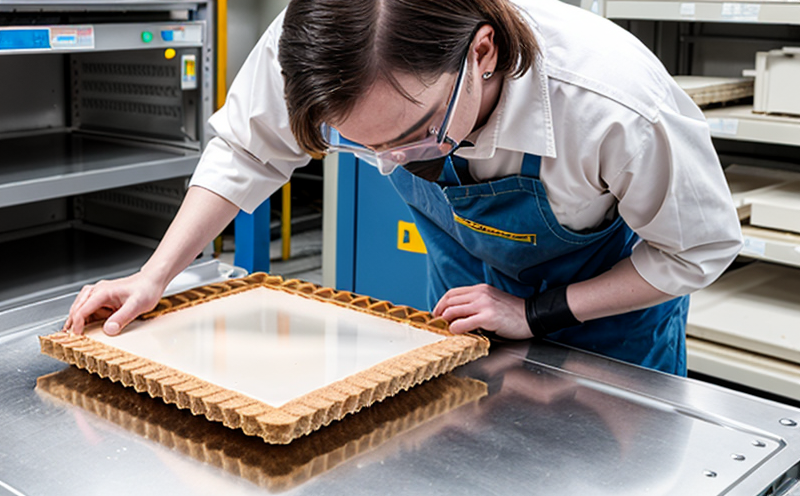ASTM F781 Wafer Passivation Layer Testing
The ASTM F781 standard is a crucial benchmark in semiconductor and microchip manufacturing. It specifies procedures to evaluate wafer passivation layers, which are essential for the reliability of integrated circuits by protecting active devices from external environmental factors such as moisture, contamination, and mechanical damage.
Wafer passivation layers play a pivotal role in ensuring that the electrical components within the semiconductor device function optimally. These layers not only protect against physical degradation but also prevent short-circuiting between different parts of the chip. The testing procedure outlined in ASTM F781 aims to ensure that these layers are defect-free and meet the stringent requirements set for their performance.
The testing process involves a series of critical steps, starting with thorough cleaning and drying of the wafer sample. This is followed by the application of test solutions designed to simulate real-world conditions under which the passivation layer will be exposed. The samples are then subjected to a range of tests that include measuring thickness, checking for uniformity, and assessing adhesion strength.
The ASTM F781 standard also incorporates advanced techniques such as X-ray fluorescence (XRF) analysis, scanning electron microscopy (SEM), and profilometry. These methods provide detailed insights into the composition and structure of the passivation layer, ensuring that it meets the precise specifications required by industry standards.
Understanding the importance of wafer passivation layers is essential for quality managers and compliance officers. Reliable testing ensures that semiconductor manufacturers adhere to stringent quality control measures. For R&D engineers, this service offers a means to innovate and improve upon existing processes. In the realm of procurement, ensuring adherence to ASTM F781 can help in selecting high-quality suppliers and materials.
The ASTM F781 standard is widely recognized for its comprehensive approach to wafer passivation layer testing. By following these guidelines, manufacturers can enhance the reliability and performance of their semiconductor products, thereby gaining a competitive edge in the market.
Why It Matters
The integrity of the wafer passivation layer is paramount for ensuring the longevity and reliability of semiconductor devices. Any defect or imperfection within these layers can lead to premature failures, reduced performance, and increased operational costs. The ASTM F781 standard provides a robust framework that helps manufacturers identify potential issues early in the production process.
By adhering to this standard, semiconductor companies not only meet regulatory requirements but also enhance their reputation for quality and reliability. This is particularly important given the increasing demand for high-performance electronics in various applications, including consumer electronics, automotive systems, and medical devices.
The testing procedures outlined in ASTM F781 are designed to be stringent yet practical, ensuring that the passivation layers meet the necessary standards without adding unnecessary complexity to the production process. This balance is crucial for maintaining a competitive edge in the global semiconductor market.
For quality managers and compliance officers, adherence to ASTM F781 ensures consistent product quality and regulatory compliance. For R&D engineers, it provides a reliable platform for innovation and improvement. In procurement, ensuring that suppliers meet these standards can help in selecting high-quality materials and components.
Applied Standards
The ASTM F781 standard is based on international best practices and aligns with other relevant standards such as ISO 9001 for quality management systems, IEC 61133 for railway applications, and EN 50124 for power system protection. These standards collectively provide a comprehensive framework that ensures the reliability and safety of semiconductor devices.
The ASTM F781 standard specifically addresses the testing of wafer passivation layers using non-destructive methods such as X-ray fluorescence (XRF) analysis, scanning electron microscopy (SEM), and profilometry. These techniques are chosen for their accuracy and repeatability, ensuring that the test results are consistent and reliable.
The standard also includes detailed acceptance criteria for various parameters such as thickness uniformity, adhesion strength, and composition homogeneity. These criteria are based on extensive research and industry experience, making ASTM F781 a trusted benchmark in the semiconductor testing field.
Industry Applications
In consumer electronics, reliable wafer passivation layers ensure that devices such as smartphones and tablets perform optimally for extended periods.
In automotive systems, these layers help to protect critical components from environmental factors, enhancing the overall reliability of vehicles.
In medical devices, the integrity of semiconductor components is crucial for ensuring patient safety and device performance.
In aerospace applications, where environmental conditions can be harsh, wafer passivation layers play a vital role in maintaining the functionality of electronic systems.
In telecommunications, reliable testing ensures that semiconductor devices can handle high-frequency signals without degradation.
In data centers and cloud computing infrastructure, the reliability of semiconductor components is essential for ensuring efficient and secure operations.
These applications highlight the importance of ASTM F781 in maintaining the quality and performance of semiconductor devices across various industries. By adhering to this standard, manufacturers can ensure that their products meet the highest industry standards and are trusted by consumers and professionals alike.





